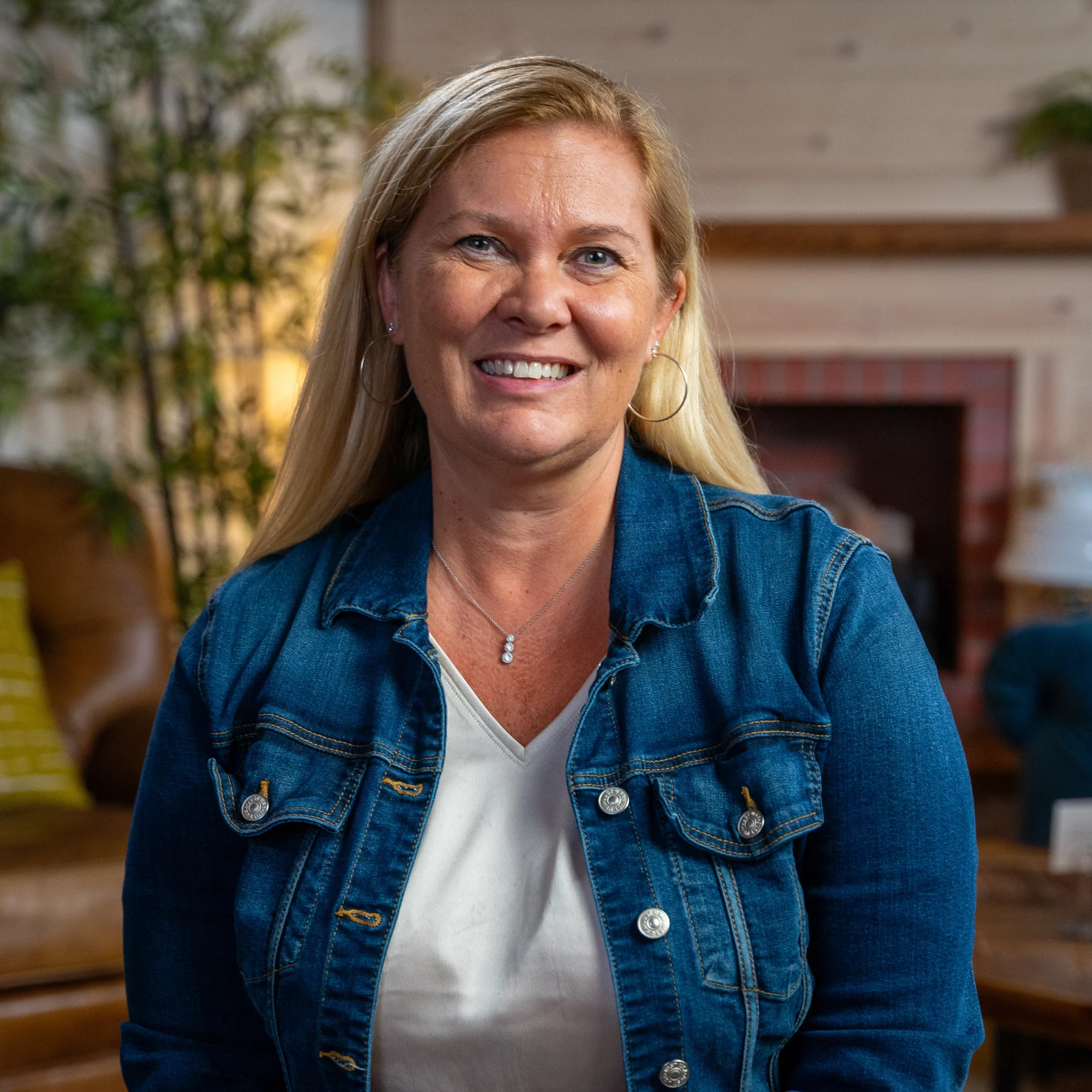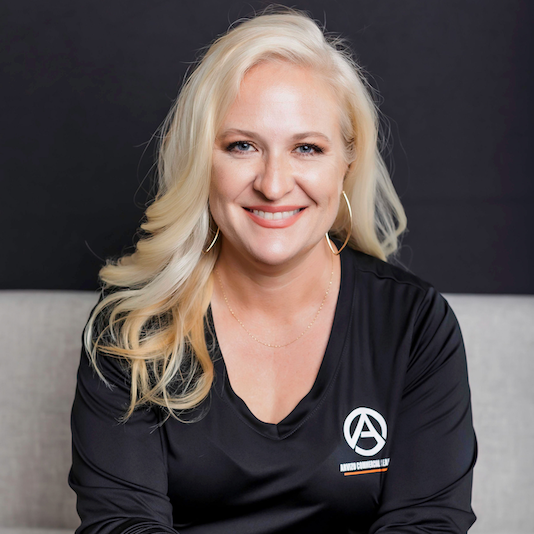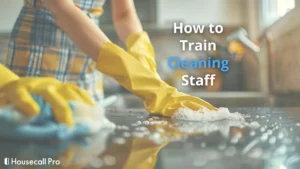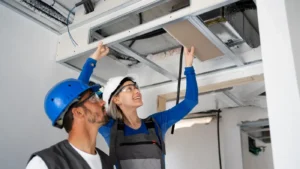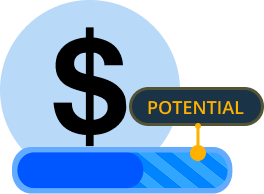
Want to see your potential revenue?
See what businesses like yours earn with Housecall Pro in 1 - 2 minutes.
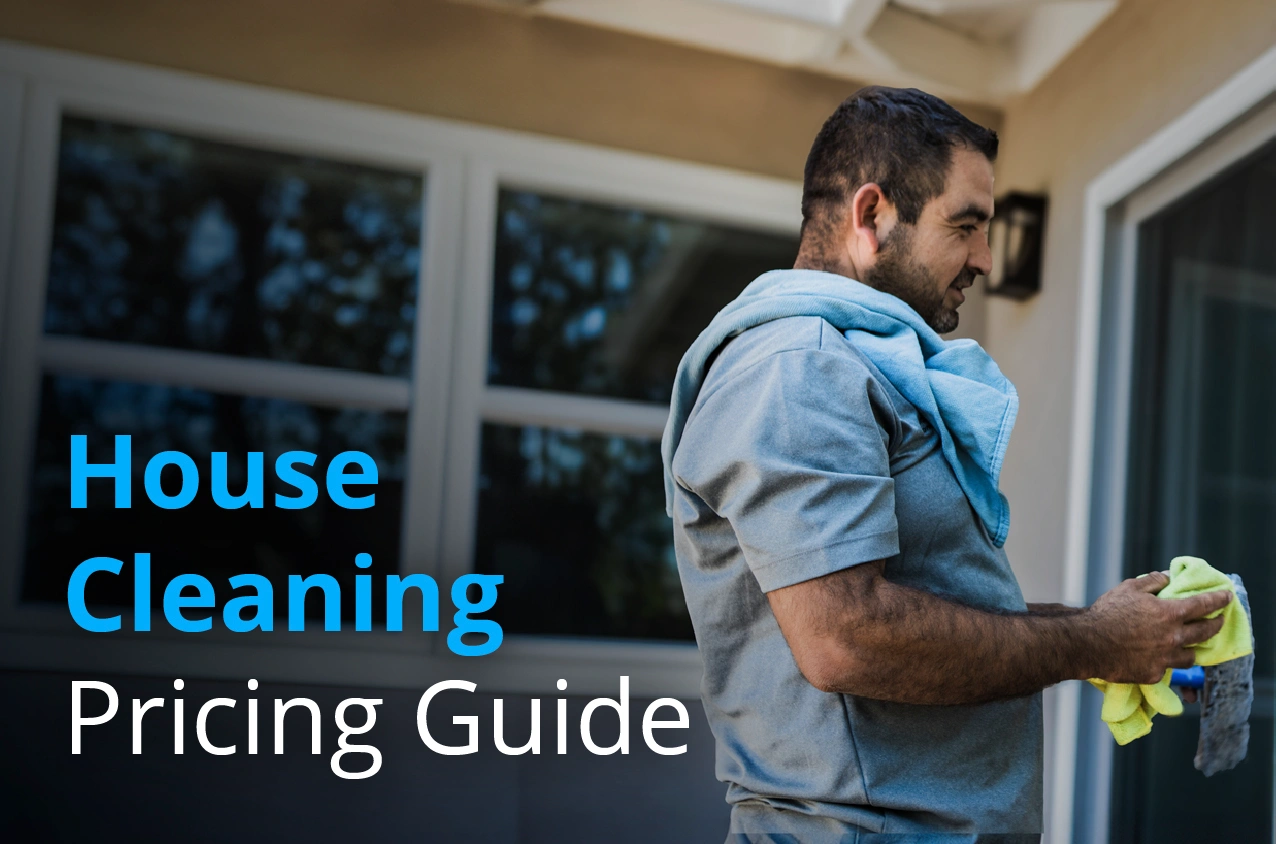
Figuring out how much to charge for house cleaning is a delicate balance. Set your prices too low, and you risk undercutting your hard work. Set them too high, and you might struggle to attract clients. The right rate depends on several factors, including the home’s size, the type of cleaning required, your level of experience, and what competitors charge in your local market.
To give you a clear picture of how pricing works in the house cleaning industry, we’ll break down pricing models, average rates across the U.S., and how to adjust your prices for different jobs.
Key takeaways:
Here’s a quick overview of average house cleaning prices in 2026:
Standard cleaning costs $120–$280 per visit: Pricing depends on home size, location, and service frequency.
Deep cleaning costs significantly more: Most cleaners charge 50%–100% more than standard cleaning for detailed work.
Move-in and move-out cleaning runs $250–$600: Larger homes and heavy buildup increase the final price.
Recurring service lowers per-visit costs: Weekly and biweekly cleanings are cheaper than one-time jobs.
Hourly rates range from $35–$75 per cleaner: Flat-rate pricing is more common for ongoing residential work.
Table of contents
- Average house cleaning prices in 2026
- House cleaning add-on price list
- How to charge for cleaning services
- Hourly house cleaning rates
- Flat rate house cleaning
- House cleaning rates per room
- House cleaning rates per square foot
- What to consider when setting house cleaning prices
- How Housecall Pro helps you price cleaning services smarter and faster
Average house cleaning prices in 2026
Hourly house cleaning rates in 2026 typically range from $35–$75 per cleaner, depending on experience, location, and whether supplies are included. Flat rates commonly fall between $200 and $400 per job.
Most cleaners use flat-rate pricing for recurring residential cleaning, but hourly pricing is common for small jobs, apartments, or independent cleaners.
See a full overview of average 2026 cleaning prices in the table below. These rates reflect insured, professional cleaning services.
| Cleaning Type | Hourly Rate* | Flat Rate | Per Room Rate** | Square Footage Rate |
|---|---|---|---|---|
| Standard Cleaning | $50 (~2 hrs) | $200–$400 | $25–$60 | $0.10–$0.20 |
| Deep Cleaning | $50 (~4 hrs) | $240–$500 | $35–$100 | $0.12–$0.25 |
| Move-Out Cleaning | $50 (time varies) | $120–$420 | $40–$100 | $0.15–$0.3 |
| Construction Clean-Up | $50 (time varies) | $500 | N/A | $0.25 |
The average home size in the U.S. is around 2,000 square feet, so the numbers in the table reflect that. Larger homes can cost significantly more because they require more time and resources to clean, while small homes cost less. We’ll go into more detail about pricing by each type later on.
Note: Prices listed in this article are averages compiled from multiple reputable industry sources, including Angi, Thumbtack, and HomeGuide, to provide a realistic range for common cleaning services.
*Hourly rate assumes one cleaner; larger crews can shorten job time.
**Room rate varies by room type and condition (bathrooms/kitchens often cost more).
Standard house cleaning cost
A standard house cleaning usually includes dusting, vacuuming, mopping, bathroom sanitizing, kitchen wipe-downs, and general tidying. The cost can range from $200–$400 for an average 2,000-square-foot home, though it varies by size and frequency.
A one-time clean for a small two-bedroom apartment might be $150, while recurring service on a four-bedroom home could average $350 per visit. Homeowners often prefer flat rates for predictable pricing, especially with repeat appointments.
Deep cleaning house cost
Deep cleaning services typically cost 50%–100% more than standard house cleaning. These services involve detailed work such as baseboards, vents, heavy buildup removal, and inside appliances.
Many people schedule a deep cleaning before or after hosting guests, during spring refreshes, or for a first-time service. A large home with multiple bathrooms can easily reach the higher end of the range.
Move-out cleaning cost
Move-out cleaning cleaning prices are typically higher due to tighter rental turnover timelines and higher cleanliness expectations from landlords and property managers. Most services range from $250–$600, depending on home size and condition.
The home’s condition has a big impact on cost. A well-maintained property may only need basic service, while one with built-up grime or stains will require a deeper, more expensive clean. Many landlords require this service before returning deposits.
Construction cleanup cost
Post-construction or renovation cleaning involves clearing dust, debris, and adhesive residue as well as detailed window and surface cleaning. Because the work requires heavy-duty equipment and multiple passes, rates are higher than for standard or deep cleanings.
Pricing often runs around $0.25 per square foot, or about $500 for a 2,000-square-foot property, though hourly rates may also apply. The total cost depends on the types of debris and surfaces involved, since professional cleaners may use different products for wood, tile, glass, or metal.
House cleaning add-on price list
Add-on services are a great way to boost your revenue. Consider bundling complementary services, like window washing with a deep clean, or showcasing high-value extras that save clients time, like inside-appliance cleaning. Seasonal or recurring add-ons, like carpet shampooing in the fall or spring, can also encourage repeat bookings.
The table below shows common house cleaning add-ons and their average prices.
| Add-On Service | Average Price Per Job |
|---|---|
| Baseboard cleaning | $25–$75 |
| Cabinet organization | $100 |
| Carpet cleaning | $75–$200 |
| Cleaning the interior of cabinets | $20–$50 |
| Changing bedsheets | $10–$40 per bed |
| Dusting blinds | $10–$50 per blind |
| Exterior window cleaning | $150–$302 |
| Interior window cleaning | $4–$10 per window |
| Floor polishing/waxing | $25–$50 |
| Fridge cleaning | $10–$40 |
| Furniture upholstery/curtain cleaning | $120–$231 |
| General dusting | $10–$30 |
| Green cleaning | Approximately $50 per hour |
| Laundry | $15–$30 per load |
| Oven cleaning | $20–$40 |
| Polishing wood surfaces | $25–$50 |
Pro tip: With Housecall Pro, you can list add-on services directly in your booking form or invoice, making it easy for customers to choose extras while increasing your revenue per job.
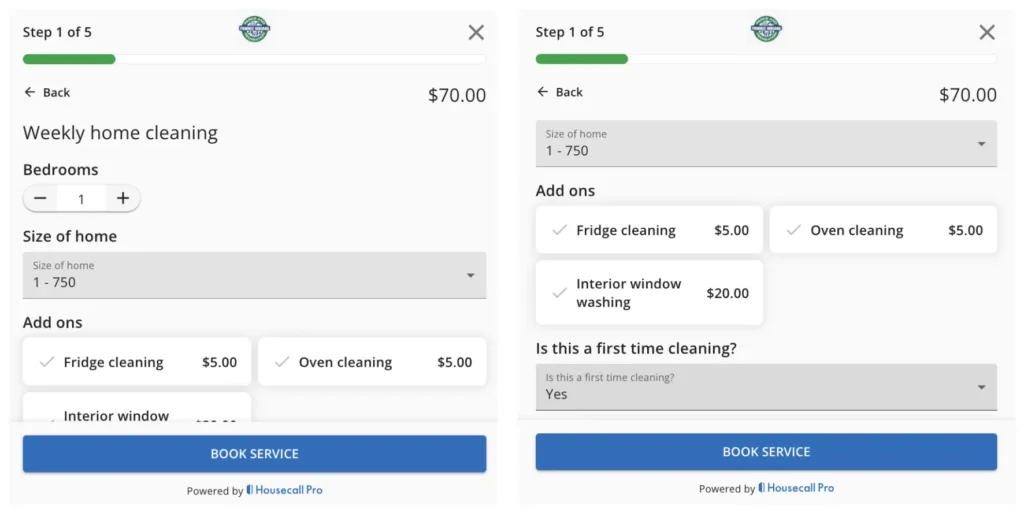
How to charge for cleaning services
Before setting your rates, you’ll need to choose a clear pricing structure. House cleaners have a few options:
- Hourly rate: Bill customers for every hour you spend cleaning.
- Flat rate: Charge one set price per visit, no matter the size of the home.
- Room-based rate: Price the job based on the number or type of rooms.
- Square-foot rate: Charge based on the home’s total square footage.
- Recurring packages: Offer weekly, biweekly, or monthly subscriptions, often with a small discount to encourage repeat business.
Each model has pros and cons depending on your business goals, customer base, and the types of homes you clean. Don’t worry if it feels like a lot to choose from. We’ll break down each pricing structure and how to calculate your rates so you can decide what makes the most sense for your business.
| Pricing Structure | When to Use | When to Avoid |
|---|---|---|
| Hourly rate | When jobs vary visit-to-visit or you’re unsure how long they’ll take | When clients want set pricing or flat rate work pays more |
| Flat rate | When clients want a set price or you know how long the job will take | For large or messy homes, or when job time is hard to estimate |
| By room | When pricing quickly or setting rates for large/commercial spaces | Home with large, tricky rooms or uneven cleaning times |
| By square footage | Big homes or repeat jobs | Deep cleaning for homes that haven’t been cleaned in a while |
| Recurring packages | Weekly, biweekly, or monthly clients | One-time jobs or homes that vary a lot from visit to visit |
Many cleaners use a mix of pricing structures depending on the job and client. For example, you might charge a flat rate for a typical two-bedroom home, switch to hourly for unpredictable or large jobs, and offer a discount on recurring visits.
If your rates change based on the job, let potential clients know they can reach out for a custom quote. Consider including a few example prices or typical ranges for common home sizes so they have an idea of what to expect.
Pro tip: Housecall Pro automatically handles scheduling and payments for recurring jobs so you can lock in steady income without the extra admin.
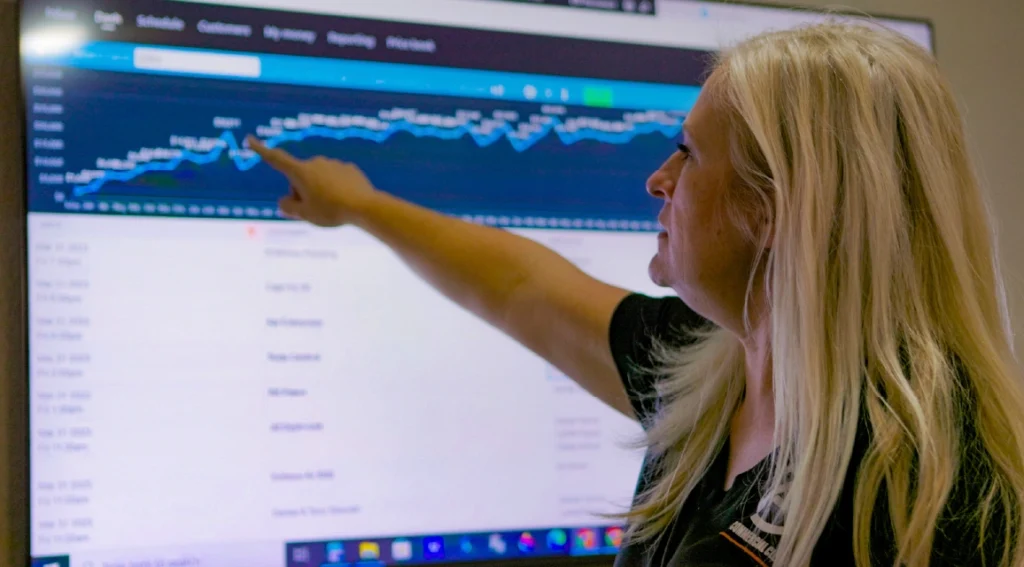
Hourly house cleaning rates
House cleaners typically charge $25-$75 per hour per worker. Most cleaning visits last two hours and require two workers, costing $100-$300 per visit.
Hourly pricing is great for new cleaners or jobs where the amount of work is easy to estimate, because it ensures you’re paid for all of your time. However, it makes the final bill less predictable for customers. If you have employees, hourly rates can also discourage efficiency because the longer they take, the more they get paid, which can reduce your overall profit on a job.
How much do house cleaners make per hour?
House cleaners make an average of $20.72 per hour, but the actual pay can vary depending on experience, location, and the type of work. As a business owner, think about what your cleaners are capable of, how tricky the jobs are, and what other cleaning companies in your area are paying. Paying a fair wage will help to attract and retain good workers.
How to calculate your hourly price
To set an hourly rate for your cleaning business, you need to cover all your costs and still make a profit. Try this simple formula:
Hourly Rate = (Total Monthly Expenses + Desired Monthly Profit) ÷ Total Billable Hours per Month
For example, if your monthly expenses are $5,000, you want $3,000 in profit, and you plan to work 160 billable hours in a month, your hourly rate would be:
(5,000 + 3,000) ÷ 160 = 50
So you’d charge $50 per hour to cover costs and meet your profit goal.
Flat rate house cleaning
Flat-rate pricing is one of the most common models in the cleaning industry. For a standard home around 2,000 square feet, flat rates typically range from $200–$400 for basic cleaning and $240–$500 for deep cleaning.
Customers like this structure because they know the total price upfront. It’s also great for businesses because it rewards efficiency; unlike hourly pricing, finishing faster doesn’t reduce how much you make. However, if a job takes longer than expected, you might end up earning less per hour. For this reason, flat rates work best for recurring clients and homes where the scope of work is predictable.
How to calculate your flat rate
To create a flat rate, add up all your costs and profit goals using this formula:
Flat Rate = (Estimated Hours × Labor Cost) + Supplies + Overhead + Desired Profit
For example, if a deep clean takes three hours with two cleaners at $20/hour each, labor is $120. If you add $15 for supplies, $30 for overhead, and $60 profit, your flat rate would be:
(3 × $40) + 15 + 30 + 60 = $225 total
This predictable structure lets you present clear, all-in pricing while making sure you’re covering expenses and still generating profit.
House cleaning rates per room
Another way to price house cleaning is by the number of rooms, which gives homeowners an easy way to estimate costs. Rates usually differ for standard versus deep cleaning, since deep cleaning requires more time and detail. The more bedrooms and bathrooms a home has, the higher the overall cost will be.
Below is a breakdown of average price ranges by room count to help set expectations for different home sizes.
| Number of Rooms | Standard Cleaning | Deep Cleaning |
|---|---|---|
| Studio | $60–$90 | $75–$130 |
| 1-bedroom | $75–$110 | $90–$150 |
| 2-bedroom | $100–$150 | $120–$200 |
| 3-bedroom | $130–$200 | $150–$300 |
| 4-bedroom | $150–$210 | $200–$420 |
| Additional rooms | $25–$35 each | $25–$45 each |
How to calculate your per-room pricing
To set per-room pricing, use this formula:
Room Rate = (Number of Rooms × Base Price per Room) + Supplies + Overhead + Desired Profit
For example, if you charge $30 per room and a client has five rooms, the base is $120. Add $15 for supplies, $30 for overhead, and $60 profit, and you get:
(5 x 30) + 15 +30 + 60 = $255 total
This approach works well for smaller homes or apartments where room counts give a straightforward estimate.
House cleaning rates per square foot
Some cleaning businesses charge by square footage, which helps standardize pricing across homes of different sizes. Typical rates range from about $0.10–$0.25 per square foot, depending on whether it’s a standard or deep cleaning.
In 2026, many cleaning companies base pricing on square footage and estimated labor time rather than room count alone, especially for homes over 3,000 square feet.
| Square Footage | Standard Cleaning | Deep Cleaning |
|---|---|---|
| 1,000 or less | $100–$200 | $120–$250 |
| 2,000 | $200–$400 | $240–$500 |
| 3,000 | $300–$600 | $360–$7500 |
How to calculate your square footage pricing
Once you know your rate per square foot, you can apply a simple formula to cover costs and build in profit.
Square-Foot Rate = (Total Square Footage × Price per Sq. Ft.) + Supplies + Overhead + Desired Profit
For example, if a 2,000-square-foot home is priced at $0.15 per square foot, the base cost is $300. Add $15 for supplies, $30 for overhead, and $60 profit.
(2,000 x 0.15) + 15 + 30 + 60 = $405 total
Pro tip: Housecall Pro’s reporting tools help you track billable hours and job costs, so you always know whether your pricing is covering expenses and hitting your profit goals.
What to consider when setting house cleaning prices
Regardless of the pricing strategy you choose, there are several factors you always need to keep in mind.
1. Location
- Research the local market rates for cleaning services in your area.
- Consider the cost of living and average income levels in your target neighborhoods.
- Adjust your pricing strategy accordingly to remain competitive while ensuring profitability.
2. Labor
- Estimate the time required to complete the cleaning job, factoring in the complexity of the work.
- Determine the number of cleaners needed for the job and how this impacts efficiency and total labor cost.
- Manage customer expectations by being transparent about how long the cleaning service will take.
3. Frequency
- Determine whether the cleaning service will be a one-time or recurring appointment.
- Offer discounts or package deals for clients who book regular cleaning sessions to encourage repeat business.
- Adjust your pricing structure to reflect the frequency of the cleaning service and ensure long-term client satisfaction.
4. Overhead and supply costs
- Calculate the cost of cleaning supplies and equipment required for the job. Include expenses for specialized cleaning products, tools, and disposable items like gloves and wipes.
- Consider buying supplies in bulk to lower costs and pass on the savings to your clients.
- Factor in overhead, such as insurance, transportation, marketing, administrative expenses, and any other fixed costs needed to keep your business running.
5. Profit margin
- Decide on a target profit (10%–35%), depending on the size of your business, your overhead costs, and whether you offer residential, commercial, or specialty cleaning services.
- Regularly review your profit margins to ensure your business remains sustainable and competitive.
6. Taxes
- Learn about tax regulations and requirements for small businesses in your region.
- Consult with a tax professional to ensure compliance and accurately calculate taxes owed.
- Add taxes into your pricing strategy to avoid unexpected financial burdens.
7. Special considerations
- Factor in insurance and liability costs when setting your rates.
- Rush or last-minute jobs may justify higher rates.
- Consider charging more for seasonal pricing like spring cleaning or holidays.
- Client-specific factors like pets, clutter, or accessibility can affect labor and pricing.
How Housecall Pro helps you price cleaning services smarter and faster

How you price your cleaning services is up to you, but Housecall Pro makes it easier to get it right. Our pricing form helps you break down the details quickly and accurately. You can customize fields to charge per bedroom, per bathroom, or per square foot, and even include options for pets, preferred cleaning products, or other add-ons.
The information you enter is what your customers will see when booking online, so it’s easy for them to select the right options. We recommend creating multiple forms if your rates vary by cleaning frequency or type. For example, separate forms for weekly, biweekly, monthly, deep, or move-out cleans.
Even if you charge hourly or flat rates, using pricing forms will streamline scheduling and ensure accurate, professional quotes every time.
Ready to simplify your pricing and win more jobs? Try Housecall Pro’s cleaning software today.
House Cleaning Pricing FAQ
-
How do I price my house cleaning services?
-
To price your house cleaning services, consider home size, type of cleaning, labor, supplies, and overhead. You can charge hourly ($25–$75 per cleaner), a flat rate ($200–$400 for a standard home), per room, or per square foot. Make sure to factor in a profit margin to keep your business sustainable.
-
How much should I charge to clean someone’s house?
-
Most house cleaners charge $50 per hour, or a flat rate of $200–$400 for a standard 2,000-square-foot home. Deep cleaning typically costs $240–$500, while post-construction cleaning can run around $500.
-
How to calculate the price to clean a house?
-
To calculate the price to clean a house, add your labor costs, cleaning supplies, overhead, and desired profit. Then, choose a pricing model (hourly, flat rate, per room, or per square foot) to determine a total that covers your expenses and earns a fair profit.
-
How do I give a quote for house cleaning?
-
To give a quote for house cleaning, assess the home’s size, condition, and type of cleaning needed, then calculate costs for labor, supplies, overhead, and profit. Present a clear price using an hourly rate, flat rate, per-room, or per-square-foot model, and let clients know if the quote can be customized for special requests.
-
How much should I pay a cleaner per hour?
-
Most house cleaners earn $25–$75 per hour depending on their experience, location, and the type of cleaning. Paying a competitive rate will help to attract and retain good workers.
-
How long does it take to clean a 2000 sq ft house?
-
Cleaning a 2,000-square-foot house usually takes 2–4 hours for a standard cleaning, depending on the level of detail, number of cleaners, and home condition. Deep cleaning or move-out jobs can take longer.
-
What can a cleaner do in 3 hours?
-
In three hours, a house cleaner can typically complete a standard cleaning of a medium-sized home, including dusting, vacuuming, mopping, kitchen wipe-downs, bathroom sanitizing, and general tidying. For deep cleaning, they might focus on detailed tasks like baseboards, grout scrubbing, and appliance cleaning in part of the home.
